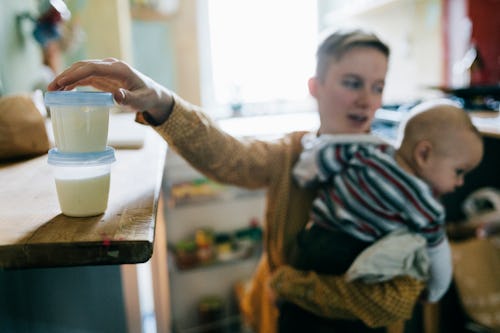
Breastfeeding is touted as the most natural way to feed your baby; still, that doesn’t mean it’s always easy. Not only is the act of nursing itself very complicated, but so are all the guidelines and procedures that go into pumping and storing your milk. Remembering all the details of proper milk care, like time limits and leaving your milk at room temperature, in the fridge, or frozen isn't simple. Like, what if some of your breast milk is left out too long? Do you have to dump breast milk that smells OK? Pouring out liquid gold that could still be good is not something any breastfeeding person wants to do.
Oops, did I leave my breast milk out too long?
Yes, there is a limit to how long your breast milk should sit out. ““It’s best to use it or store it within four hours,” says Dr. Jessica Madden, medical director at Aeroflow Breastpumps. If the temperature in your house is very warm, consider leaving it out of the fridge for even less time. “Milk needs to be stored sooner than four hours if an environment’s room temperature has been higher than about 85 degrees Fahrenheit,” Madden explains.
If the breast milk was frozen, that changes things as well. “If thawed from a frozen stash, it needs to be treated like regular food practices — up to two hours at room temperature before needing to be refrigerated," Ashley Georgakopoulos, IBCLC and Motif Medical lactation director, tells Romper.
How to tell if breast milk is spoiled
But what if your breast milk has been sitting out for about six hours, and it looks fine and smells perfectly fine? The advice stands: Don’t feed it to your child if it’s been out for longer than four to five hours, says Georgakopoulos. “Foreign pathogens and bacterial growth cannot always be detected immediately.” She notes that while you can still use it for topical purposes, like ointments or baths, it shouldn’t be used for feeding.
Giving your child contaminated breast milk isn’t a fun experience, to say the least. “The biggest concern with using breast milk that has gone bad is bacterial contamination, which puts your baby at risk of getting sick with an infection,” Madden explains. This can cause diarrhea and vomiting, and she adds, “It’s especially risky to give breast milk that’s gone bad to preemies and/or babies with fragile immune systems.” If you have doubts that your breast milk is still good, then tossing it is the best way to go.

How store breast milk to prevent spoiling
To make sure you’re not in a situation when your breast milk goes bad, make sure you’re storing it properly. Freshly expressed breast milk can be kept in the refrigerator for four to five days, Georgakopoulos says. “At that point it needs to be used or frozen,” she explains. “If thawed from a frozen stash, it needs to be used within 24 hours and kept in the fridge between use.”
Keep it towards the back of your fridge, rather than the front or on the shelves on the door, so that it stays as cool as possible, Madden recommends. You should also date it so you don’t get confused. “It’s important to put the date you pumped your breast milk on every storage bag or bottle,” she says. “Use the oldest milk first, if possible.”
Store milk in small portions, like no more than 2 to 3 ounces at a time. “This prevents you from thawing out too much milk at once,” Madden suggests.
I know, that all seems kind of confusing and complicated. The American Academy of Pediatrics (AAP) offers this conservative and easy to remember guideline to help you keep track of your milk — follow the rule of fours. Four hours at room temperature or four days in the fridge is best for keeping milk safe and fresh.
If you are thoroughly confused (as I was) about the best methods for expressing and storing breast milk, getting in touch with your pediatrician or local lactation consultant is always the best option.
Experts:
Dr. Jessica Madden, medical director at Aeroflow Breastpumps
Ashley Georgakopoulos, IBCLC and Motif Medical lactation director
Leigh Anne O’Connor, IBCLC
0 comments:
Post a Comment